The Clockwork Rocket Read online
Page 14
“Give his details to the messenger; you can wait in your cell.” A guard took the man’s chain and led him away.
The next prisoner, another young man, had trespassed in a private garden; he was not accused of stealing anything, but his fine was three times as much as the thief’s.
Everything about the process was humiliating, but Yalda prepared herself to swallow her pride. Tullia had offered to help her find the money for her fine; Daria would probably be willing to loan her a few dozen pieces. She could be out of this place by nightfall if she was suitably humble and penitent. And whatever blame fell upon her for Antonia’s fate, there was nothing to be gained by making trouble for herself. No one was going to rise up against the Council to overthrow the law on runaways because one fat solo argued with the police about an unrelated assault.
When her turn came, a guard unclamped her chain from the wall and ushered her in front of the sergeant’s desk.
“Are you Yalda, daughter of Vito?”
“Yes, sir.” The sound of her father’s name stung; Yalda had no wish to imagine him witnessing any of this.
The sergeant scanned the paper in front of him. “You are charged, firstly, with possession of a substance contrary to the order of nature and the public good. Do you dispute the charge?”
“No, sir.” In the darkness of her cell she’d rehearsed speeches on the insanity of banning a drug that spared the world fatherless children, fantasizing about the power of her impeccable logic to sway even the most hostile audience.
“On that charge, I fine you a dozen pieces.”
“Thank you, sir.”
The sergeant glanced up at her, irritated, as if her anxious tic might actually be taken to imply that the fine was lenient. “Secondly, you are charged with a grievous assault against the person of Acilio, son of Acilio, four nights ago in the square outside the Variety Hall. I have statements from six witnesses to the effect that you threw a sharpened stone that struck him and caused substantial injuries. Do you dispute the charge?”
“No, sir.”
“Do you have anything to say in mitigation?”
Yalda hesitated. Surely an honest answer would not be treated as hostility or disputation? Why ask about mitigation if you had no wish to hear the truth?
“Sir, Acilio did throw the stone at me before I assaulted him with it. It only struck me lightly, but that’s how I came to have it in my hand.”
The sergeant re-examined the paper in front of him then slid it aside and gazed up at her coldly. “What witnesses do you name for this accusation?”
“None, sir,” Yalda admitted. “Most people were looking at the sky,” she explained, “and my friend was on the other side of the square.”
“Then I fine you two dozen pieces for a gratuitous and cowardly libel,” the sergeant said, “and a further dozen for wasting my time.”
Yalda’s skin quivered, as if her body believed it could rid her of this strange insect that kept taking bites out of her flesh.
“As for the assault,” the sergeant continued, “the complainant has requested a payment of a dozen gross pieces in reparation, an amount with which I concur. Additionally, on behalf of the citizens of Zeugma, I fine you a further gross. Your total fine is a dozen-and-one gross and four dozen pieces. How will you pay this?”
Yalda couldn’t speak. Even Daria, with the fees from her public dissections, wouldn’t make that much in a year; for Tullia or Lidia it would be a lifetime’s wages.
“How will you pay?” the sergeant repeated impatiently.
“I can’t,” Yalda said. “I don’t have anything like that.”
The sergeant hummed wearily. “I don’t expect you to pluck that many coins from your pocket, you simpleton. Just give the messenger the name of someone who can organize the money for you.”
“There’s no one who can do that,” Yalda insisted. A dozen gross? She couldn’t burden Tullia with that surreal demand; she couldn’t bury all her friends in impossible debts. “Can’t you… reconsider the size of the reparation?” she pleaded.
“What I’ll do,” the sergeant said, his tone now sarcastically good-natured, “is return you to your cell for a stint, so you can reconsider the resources at your disposal.” He gestured to the guard.
As she was led back down to the basement, Yalda kept tripping on the stairs. The guard waited for her to right herself; perhaps the sheer size of her fine had impressed him to the point where any further mistreatment was superfluous.
He said, “You should pick your fights more carefully.”
Yalda said, “I didn’t even know who he was.”
The guard buzzed with mirth. “You do now.”
At first, Yalda refused to believe that things were as they seemed. A dozen gross pieces? It had to be a kind of cruel joke, a punishment for her “cowardly libel”. After a day or two she’d be hauled before the sergeant again and told what the true fine would be.
But as she heard the bells marking the end of her sixth day in prison—with the spoilt grain that she’d spurned at first, then scrabbled for blindly, now entirely gone—she experienced a moment of clarity. A part of her, she realized, had been laboring under a strange assumption: that people with the power to release her would be spending their days pondering her fate, agonizing over her hardship, questioning her punishment’s severity. And since no one was entirely devoid of feeling… anything truly intolerable to her would, in the end, be intolerable to them. Any treatment so unjust that it threatened to crush her spirit would, in the end, wear down their resolve to impose it.
But it was not like that at all. The sergeant, the guards, the Council, her accuser, buttressed by each other’s mutual approval, shared the burden of her imprisonment so equitably that it became no burden at all. No one, individually, was responsible for what they’d done to her in concert. She could die in this cell, and none of them would feel the faintest twinge of discomfort.
All she could do now was wait out the stint, then send an honest message to Tullia explaining her situation. She would not let her friends go into debt, but if they told her story to everyone at the Solo Club, perhaps some of the wealthier customers would be sympathetic to her plight. Perhaps over a year or two the money could be raised.
A narrow bridge of flesh had formed again between her sleeved arms. Yalda tugged at the fibers angrily, jerking and tearing them until the last one snapped. However long she stayed here, it wouldn’t be the guards who set her free.
On the morning of her eighth day of imprisonment, Yalda woke to find something hard on the floor when she moved her feet. She picked up the grains one by one until she had a handful, then she tipped them carefully into her mouth.
Why did she need food at all? Why not just make light, and get the energy she needed for free? She wasn’t growing, like a child; she didn’t need to add new matter to her body.
But the matter she did have was growing disordered; the microscopic building blocks of her flesh were slipping into disarray. Soil for a plant, food for an animal, offered more than materials for growth and repair: it was a source of low entropy. The rock from which it came was highly ordered—and without order, energy was useless, as likely to push you one way as another. Life rode the arrow of time that came from the world’s slow decay.
But now that she had a little order in her body, what was she going to do with it? Her captors wouldn’t let her starve to death, but how would she stay sane?
“All right, Tullia,” she whispered. “I’ll show you the life of the mind.”
Tullia had claimed that if the cosmos resembled the surface of a sphere, Yalda’s equation would render everything absurdly predictable. Her argument had sounded plausible, but Yalda wanted a deeper understanding of the problem before she abandoned the whole idea.
On a sphere, she realized, the fundamental solutions of her equation would be spherical harmonics: a kind of waveform she’d encountered once before in a course on seismology. Whatever complicated solution held across the whole surface of the
sphere, it could be written as a sum of these harmonics, each multiplied by a suitable factor measuring the size of its contribution.
Yalda worked through the calculations, raising equations on her skin in the dark. First, you fixed the physical parameters: the radius of the sphere and the wavefronts’ separation. Then, as the wave’s frequency with respect to longitude rose, its frequency with respect to latitude would fall. Since you always had to wrap whole numbers of waves around the equator and around any meridian, in the end there were only a finite number of possibilities—a finite number of relevant harmonics.
She sketched a few examples to make the calculations tangible. The north and south hemispheres were identical, so she only bothered with half the sphere, drawing the waves along the various circles of latitude where they were strongest.
Around any circle of latitude, though—however large or small—each particular harmonic would execute the same number of cycles, making each one as distinctive as the harmonics of a plucked string. So if you were given the values on any circle of latitude of any wave obeying the equation, you could separate out the harmonics and determine their respective strengths—which would give you the entire, global solution. What’s more, the choice of where the “pole” lay in this scenario was completely arbitrary; in principle, you could perform the same analysis anywhere at all.
In practice, though? If the waves were already packed six dozen gross to the scant as they marched around the cosmic equator, how could you ever hope to observe their proportionately finer undulations around a circle that was just a stride or two across? And to make the problem even more acute, the higher the harmonic the faster its strength dropped as you approached the poles, so the wavefronts associated with it would be preposterously weak, as well as unmeasurably close.
Tullia’s objection, then, was purely philosophical: the idea that the entire cosmic history of light was writ small in every last corner of the world was simply too shocking to countenance—however useless it would be for aspiring fortune-tellers. Yalda was prepared to set her unease aside and see where the rest of the theory took her, but other physicists might easily view this as a flaw as fatal as Giorgio’s original complaint. What was the use in being half right, if she wasn’t even half-believed? She needed other scientists to pursue these ideas; imprisoned or free, she couldn’t begin to explore all of their ramifications herself.
Yalda slumped forward and rested her head against the aching circle of her arms. She wanted to drag the weary muscles in these limbs all the way back into her chest and replace them with rested flesh, but with no instinct or experience to guide her, she couldn’t find a safe, painless sequence of movements that would fulfill this wish. For all the many postures she’d tried since childhood, she had never before suffered a change in the topology of her skin.
She butted the gap between her arms with the top of her head, allowing the limbs to relax for a while without touching. The sense of respite was glorious, but she knew it would only be a lapse or two before her arms started to slip together.
The loose skin in the gap was puckered into folds that brushed against the top of her skull. Yalda played with the wrinkles, sliding them back and forth to massage the top of her head. To her amusement, she realized that they’d naturally arranged themselves into a set of evenly spaced “waves”, a few dozen oscillations circumnavigating the sleeve of skin. She was practically a spherical harmonic come to life—except that she was no longer even roughly spherical. She was more like a torus, now.
A torus, instead of a sphere.
What would that change?
A torus would still prevent the exponential blow-up—you couldn’t wrap an exponential growth curve around a torus, any more than you could around a sphere—but its fundamental solutions would be different.
Yalda lifted her head and stared into the darkness. A torus didn’t even need to be curved; mathematically, you could slice it open and lay it flat, turning it into a rectangle or a square. You simply had to guarantee that the wave at each edge of the square agreed with its value on the opposite edge, so the whole thing could be put back together smoothly.
The fundamental solutions would be waves that executed whole numbers of cycles as you moved across the square in either direction, bringing the wave back to its original value. The sum of the squares of those two whole numbers would have to equal a constant—fixing the relationship between the size of the cosmos and the wavefronts’ separation.
She quickly sketched some examples, picking a constant small enough to be manageable, but large enough to be broken down into a sum of squares in a few different ways.
For the kind of waves she could draw on her body, completing a few dozen oscillations at most, there would only be a handful of solutions—which was tantamount to saying that light could only travel at a handful of different velocities, equal to the ratios between its frequencies in space and in time. But in the real, cosmic, four-dimensional case, the sum of squares would be so vast that it could be written in more ways than there were grains of sand in a prison cell, and the ratios would be so numerous and closely spaced that you’d never know they were not continuous.
For each choice of the number of waves spanning the square, you could also choose to have the wave in each direction either start at zero on the edge of the square, or start at a peak. With that additional flexibility, a completely general solution—whatever its complexities and quirks—could always be written as a sum of the fundamental solutions, multiplied by various factors.
What data would you need, in order to find those factors and reconstruct the whole wave—the whole history of light for a toroidal cosmos? Unlike the spherical harmonics, the imprint of these fundamental solutions didn’t get funnelled down toward any poles. To measure their contributions you’d need to know what the wave was doing along one entire edge of the square—and not just its value, but also its rate of change in the orthogonal direction, in order to learn about the waves that had a value of zero along the chosen edge.
These requirements were almost exactly the same as those for the physicists’ beloved plucked string: you set the initial shape of the string, and its initial motion, and the equation told you what followed. The only difference was that this equation allowed waves of any speed, so you needed to gather the same information from far away—potentially, across the whole width of the cosmos. This was the offer Tullia had made—“for one moment in time, there are no secrets from you anywhere”—no longer rendered useless by exponential growth.
In a toroidal cosmos, predictions became reasonable: by knowing about your immediate surroundings, you could predict what would happen with sufficiently slow waves in the immediate future. You’d be neither helpless nor absurdly omniscient. A wave faster than anything you’d prepared for could always come along and surprise you—like a Hurtler appearing out of nowhere—but if it didn’t, things proceeded as expected.
Replace the torus with its four-dimensional equivalent, and light that followed these hypothetical rules started to behave just as it did in the real world.
Yalda lowered her head and tried to rest her arms again, but her shoulders were burning with fatigue. She couldn’t replenish those muscles, either; all of the moves that would have achieved that required her to separate her arms completely.
At least she now knew how to word her message to Tullia. “If you can’t help me pay this fine,” she’d say, “I only ask you to think carefully about the shape my body is in.”
On the eleventh day, two guards with lamps entered Yalda’s cell and unclamped her chain from the wall. She didn’t question what was happening; if the sergeant had rescheduled her appearance for a few days earlier, so much the better.
Upstairs, she was almost blinded by the glare. She didn’t realize she’d been taken to a different room than before until one of the guards made her kneel and held something in front of her face. As he turned the object, her eyes were stabbed by a glimmer of reflected sunlight.
“Are
you ready?” he demanded impatiently.
“For what?” she asked, alarmed and confused.
“Someone paid your fine,” he said. “We’re cutting you free.”
Yalda tightened the skin between her arms, shrinking it down to a thumb-sized stub. She’d had fantasies about making the cut herself, or even using her teeth to tear through the skin, but at least there was still no flesh to be severed.
The guard had her place her arms on a wooden bench. The process was swift, and if it wasn’t exactly painless it hurt far less than the original melding. When the guard slipped the chain off her arm, Yalda resorbed the abused limbs completely. She rose to her feet and took a step back, then rolled her shoulders and chirped with bliss as she rearranged half the flesh in her torso. Her two small wounds ended up at the sides of her back.
The guard said irritably, “Could you groom yourself outside?”
“With pleasure.” Yalda didn’t waste time asking him who’d paid her fine; Tullia would know which businesswoman from the Solo Club had taken pity on her, and would be able to advise her on the proper way to express her thanks.
Yalda moved slowly down the corridor toward the dazzling rectangle of light that marked the entrance to the barracks. She would never have lasted a year; she could admit that now. She would have been dead or insane in a dozen stints. She needed to visit the chemistry department at the first opportunity, and come back with something volatile enough to turn this whole abomination into rubble.
She stepped out beneath the sky, shivering, humming softly to herself. For a moment she was hurt that Tullia wasn’t waiting on the street to welcome her back to freedom, but that was petty; the world hadn’t come to a halt, Tullia still needed to earn a living. She extruded two fresh arms and shielded her eyes as she looked around, trying to orient herself.
“Yalda?” A male figure approached through the haze of brightness.

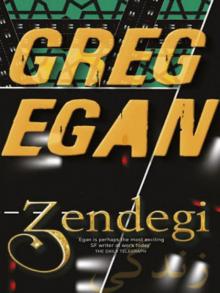 Zendegi
Zendegi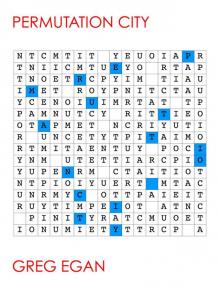 Permutation City
Permutation City The Eternal Flame
The Eternal Flame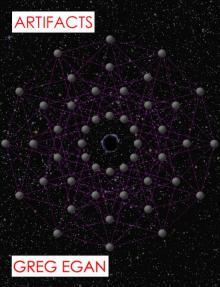 Artifacts
Artifacts Wang's Carpets
Wang's Carpets Dichronauts
Dichronauts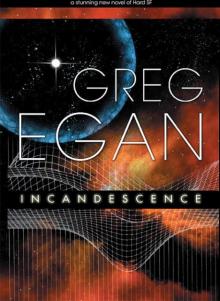 Incandescence
Incandescence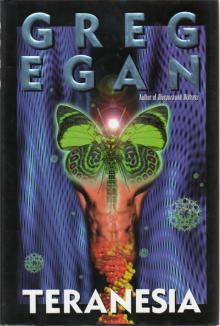 Teranesia
Teranesia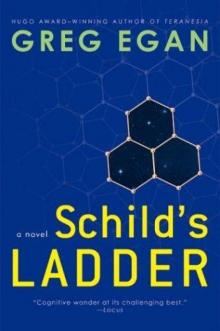 Schild's Ladder
Schild's Ladder Quarantine
Quarantine The Four Thousand, the Eight Hundred
The Four Thousand, the Eight Hundred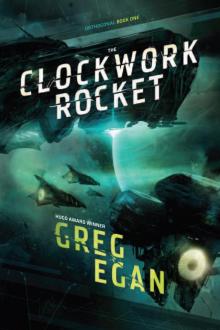 The Clockwork Rocket
The Clockwork Rocket Zeitgeber
Zeitgeber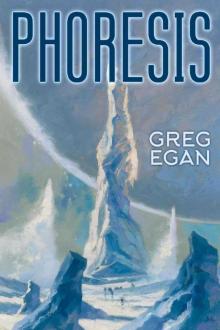 Phoresis
Phoresis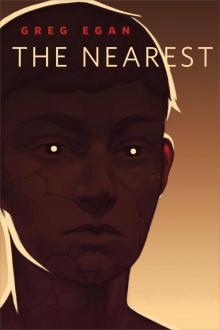 The Nearest
The Nearest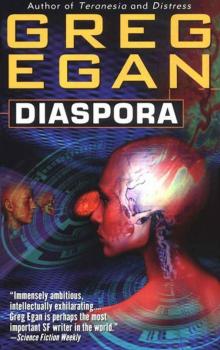 Diaspora
Diaspora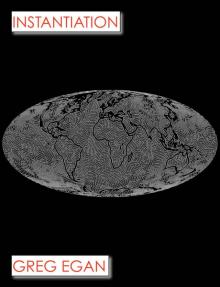 Instantiation
Instantiation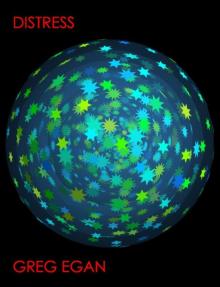 Distress
Distress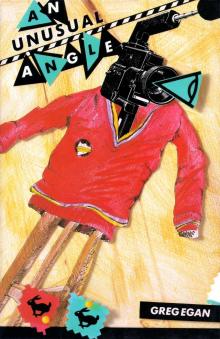 An Unusual Angle
An Unusual Angle Oceanic
Oceanic The Arrows of Time
The Arrows of Time Axiomatic
Axiomatic![Anthology 2. Luminous [1998, 2010] Read online](http://i1.bookreadfree.com/i/03/18/anthology_2_luminous_1998_2010_preview.jpg) Anthology 2. Luminous [1998, 2010]
Anthology 2. Luminous [1998, 2010] Perihelion Summer
Perihelion Summer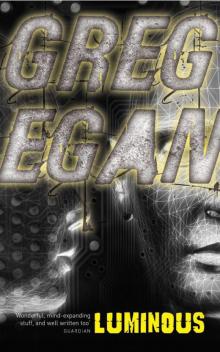 Luminous
Luminous